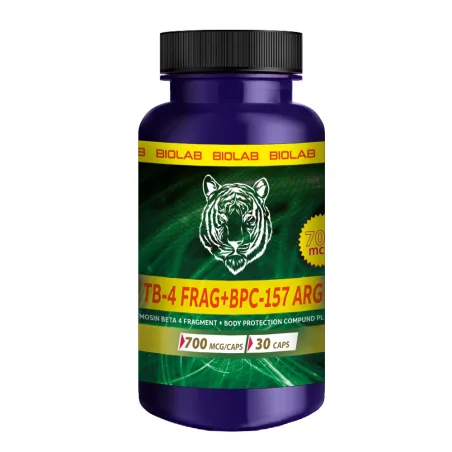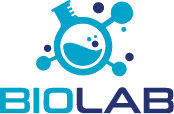
TB-4 FRAG+BPC-157 ARG 700mcg
Product code:


Product code:


















TB-4 FRAG 500mcg +BPC-157 ARG 200mcg
Product advantages:
Thymosin beta 4 is a natural human protein. It consists of 43 amino acids and has a molecular weight of 4291 g/mol. It is capable of binding to actin proteins and is considered the main actin sequestering protein in most cells. Therefore, it plays a very important role in the polymerization of actin filaments, which are important for cell structure, cell mobility, and extracellular matrix function. There is speculation, though no concrete evidence at present, suggesting that Thymosin beta 4 binds to extracellular receptors in the fluids surrounding cells, mediating some of its effects.
Like many naturally occurring proteins, Thymosin Beta 4 has a very long peptide sequence and should only be administered subcutaneously. It is not bioavailable after oral or intranasal administration. The researchers found that the active domain of thymosin beta 3, a region of just 7 amino acids (LKKTETQ), retains most of the larger protein's effects on cell migration, actin polymerization and wound healing. This fragmented section is called the TB500 fragment. Because the TB500 fragment is much smaller than its parent molecule, it is more easily absorbed in the digestive tract and then by cells. This increased oral bioavailability makes the TB500 fragment easier to administer than the 43 amino acid Thymosin Beta 4 and contributes to the effectiveness of the fragment.
The TB500 fragment can be broken down from 7 amino acids to just four (Ac-Ser-Asp-Lys-Pro) to produce a peptide that retains many of the properties of the larger peptide. Ac-SDKP has been found to occur naturally and is broken down by ACE (angiotensin converting enzyme) activity. This may be the reason why ACE inhibitors help prevent scarring and cardiac remodeling as Ac-SDKP is an anti-fibrotic and anti-inflammatory peptide known to promote blood vessel growth, reduce inflammation and reduce scarring after injury.
The correct chemical formula as well as the molecular weight of this agent - remember if your peptide supplier does not provide you with research, no one really knows, not even he himself, what he sells you ? is:
Molecular formula: C20H33N5O9
Molecular weight: 487.5 g/mol
PubChem ID number: 65938
1. Ac-SDKP has an immunomodulatory effect but is of interest primarily because of its angiogenic properties. Research shows that Ac-SDKP, sometimes called goralatide, is a powerful stimulator of blood vessel growth and therefore may benefit wound healing, cognitive health, nerve growth, and heart health. Research on this peptide is somewhat limited at present but progressing rapidly. There is now good evidence that Ac-SDKP can reduce bone marrow damage caused by chemotherapy.
2. Of particular interest is the ability of thymosin beta-4 and TB-500 to slow down or even reverse the effects of cognitive diseases. Research shows that these peptides help to improve the process of autophagy, which is one of several mechanisms used by the body to remove waste products and accumulated impurities. Research shows that increased autophagy in the brains of Alzheimer's disease models leads to increased cholinergic signaling and thus reduces some of the cognitive effects of the disease.
https://pubmed.ncbi.nlm.nih.gov/30552633/
3. Studies in rats show that these peptides stimulate nervous system tissue to remodel after injury. In particular, boththymosin beta-4 and TB-500 appear to activate the cells that support neurons and keep them healthy. This leads to improved blood vessel growth in the brain as well as increased neuronal growth. In animal models of stroke, administration of thymosin beta-4 leads to improved behavior, motor control and cognitive function.
https://pubmed.ncbi.nlm.nih.gov/23739235/
4. Studies show that the use of hydrogels containing thymosin beta-4 during heart repair procedures (e.g. bypass surgery, stent implantation) increases the growth of blood vessels and the migration of endothelial and epicardial cells. This leads to an increased recovery rate from ischemia and reduces the risk of long-term complications.
https://pubmed.ncbi.nlm.nih.gov/29710844/
Additionally, research indicates that thymosin beta-4, but not TB-500, may promote cell survival when administered in acute or urgent cardiovascular situations. Only Thymosin beta-4 has the latter effect because the Ac-SDKP component of the peptide is required. Overall, however, research supports the idea that these peptides can preserve cardiovascular function if administered timely during or immediately after an ischemic event such as a heart attack.
5. One interesting property of TB-500 and Thymosin Beta-4 is that they may work in conjunction with antibiotics to help treat infections. This is a very important discovery in the context of the growing resistance of many bacteria to currently available antibiotics. Studies in mice infected with Pseudomonas aeruginosa, a particularly problematic pathogen, have shown that combining thymosin beta-4 with ciprofloxacin increases the effectiveness of the antibiotic, improving healing, reducing inflammation and speeding recovery.
https://www.ncbi.nlm.nih.gov/pmc/articles/PMC6210523/
6. Scientists accidentally discovered that mice with a genetic deficiency of thymosin beta-4 have hair that grows much slower than those that do not. Giving them thymosin beta-4 restores the rate of hair growth and giving them to normal mice accelerates hair growth. Research in this area is limited, so the mechanism of action of this increased growth is not fully understood. This may be one application where TB-500 can shine, however, as topical application of the smaller molecule will likely lead to more effective absorption. For now, however, it is clear that Thymosin beta-4 has a huge impact on hair growth.
https://pubmed.ncbi.nlm.nih.gov/17947589/
TB-500 and thymosin beta-4 are similar in many respects as TB-500 is a synthetic derivative of thymosin beta-4. The latter, however, is considered more effective because it contains an additional active domain that enhances its function. Thus, thymosin beta-4 can be considered to cause the same reactions as TB-500, but to a much greater extent. For this reason, the two terms are often used interchangeably even though they do not refer to exactly the same molecule. Many companies try to avoid Internet search problems by simply referring to TB-500 and thymosin beta-4 as if they were the same thing. For researchers wanting to be sure they have one peptide over another, it is always necessary to check the amino acid sequence. If the peptide is more than seven amino acids long, it is probably thymosin beta-4, which is 43 amino acids long.

Your review appreciation cannot be sent
Report comment
Report sent
Your report cannot be sent
Write your review
Review sent
Your review cannot be sent
Customers who bought this product also bought:
Minoxidil 80mg/1ml - 30ml
EPITHALON SPRAY 10mg
Coenzym Q10+PQQ
BRAIN MATRIX MIX 350mg /...
MAGNESIUM TAURATE
Product no longer available
BPC-157 ARG capsules 200mcg
ASTRAGALUS PL
Newsletter
SIGN UP AND STAY UP TO DATE!
We specialize in wholesale and retail supply of high quality peptides.
Category
Our company
Add to wishlist
((title))
Sign in
You need to be logged in to save products in your wishlist.